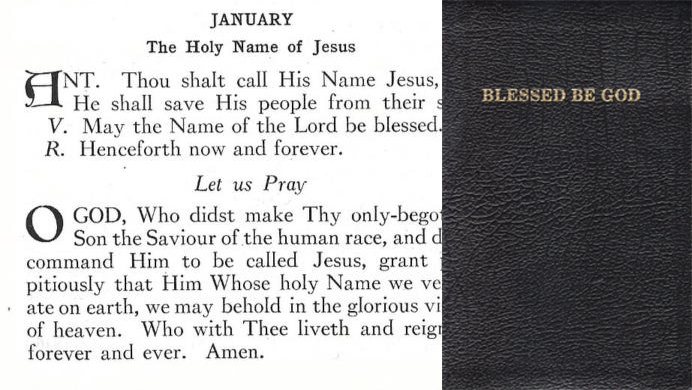The Commemoration: A Liturgical Devotion
Blessed Be God, a prayer book which has been in print for almost a hundred years now, has enjoyed a renewed popularity of late thanks to its excellent collection of prayers and devotions.
One of the particularly wonderful things about this book is its copious use of liturgical commemorations. Commemorations are short little snapshots of a feast, traditionally used at Lauds and Vespers when that feast has been superseded by a higher-ranking one but is still nevertheless worthy of being remembered. They have three main parts: an Antiphon, a Verse and Response, and the Prayer or Collect.
Commemorations have been printed devotionally for quite some time, but few prayer books have done so as richly as this one. This one little volume can actually serve all by itself as a sort of “Little Office” for the laity that can be used throughout the year.
For Catholics, of course, the most important way to mark time is through the liturgical year. In the section “Devotions for the Holy Days and Special Feasts” (p. 196-252), Blessed Be God gives us commemorations for the Circumcision, the Epiphany, Candlemas, and St. Joseph; Holy Thursday, Good Friday, and Holy Saturday; then ones for Paschaltide including Easter, the Rogation Days, the Ascension, and Pentecost; and finally Corpus Christi, Ss. Peter and Paul, the Assumption, Ember Days, All Saints, All Souls, Immaculate Conception, and Christmas. The following section, “Devotions for the Seasons of the Year” (p. 253-256), has additional commemorations for Advent, Christmastide, Septuagesima and Lent, Passiontide, and Eastertide.
But the book also diverges from the liturgical calendar proper and offers commemorations for each day of the week: Sunday (The Most Blessed Trinity), Monday (The Souls in Purgatory), Tuesday (The Holy Angels), Wednesday (St. Joseph), Thursday (The Most Blessed Sacrament), Friday (The Passion of Christ), and Saturday (The Blessed Virgin). Next the months are commemorated: the Holy Name in January, the Holy Family in February. St. Joseph in March, and so on.
Catholics may well know that May is dedicated to our Lady, that October is dedicated to the Rosary, and November is for the Holy Souls. We abstain from meat, of course, on Fridays. But what do we do on the other months and days? Are they not worthy of giving back to God as well?
And even the well-known “special” days and month just mentioned–do we really acknowledge and keep these devotionally? Or do we sometimes simply acknowledge the fact and move on, as if the knowledge alone was sufficient?
The great strength of Blessed Be God, with its numerous commemorations, is that it helps give structure to those popular devotions. Each feast, each season, each day of the week, and each month of the year has its own special prayer. These take less than a minute to say, and as such they are accessible even to the busiest working dad and homeschooling mom.
Praying the commemorations keeps us in the spirit of each liturgical feast and season, and since they come directly from the texts of Lauds and Vespers, by entering more deeply into them we can, in our own little way, participate in the public liturgy of Holy Mother Church.
June 8, 2020









